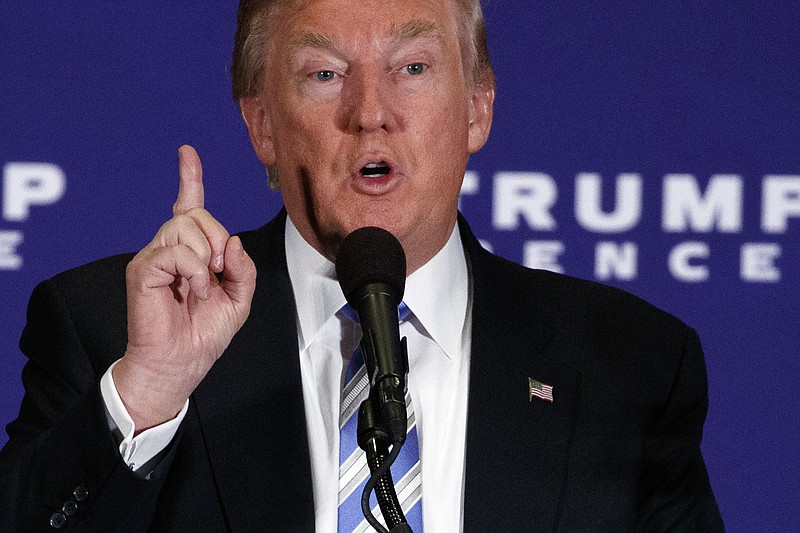Donald Trump is right. The Democratic Party has failed African-Americans.
Ever since blacks forcefully abandoned the party of Lincoln in 1964 and turned out 94 percent of their vote for President Lyndon B. Johnson, Democrats have enjoyed a cozy relationship with a dedicated constituency that has demanded very little in return.
Blacks have repeatedly given the Democratic Party a blank check to do whatever it chooses and still guarantee voter turnout of an average of 88 percent. Thus far, blacks have seen minimal economic return on their investment.
Yes, Trump spoke the truth. Too many African-Americans are living in poverty. Too many of our schools are no good. We have too few jobs. And large numbers of our youth are unemployed.
So what the hell do we have to lose by voting for him, he asks? But the question most African-Americans have for Trump is: What the hell would we gain?
African-Americans have no idea because Trump has been too much of a coward to look them in the eye and tell them. He turned down several opportunities to speak directly to African-Americans, declining invitations from the NAACP, the National Association of Black Journalists and the National Urban League.
Blacks are left to assume that he has no workable solutions to the unique problems that plague African-American communities.
In effect, this man whose campaign thus far has reeked of bigotry and racism is asking blacks to just trust that he will do right by them.
Does he really think African-Americans are that stupid?
What he apparently doesn't get is that many blacks don't give a hoot about either political party. It's the individual candidate that draws them to the polls.
Contrary to what Trump might think, black voters care about the same things as other Americans. They want a thriving national economy. They want to go to work without fearing that terrorists are going to fly a plane through their high-rise. Some blacks also want America to treat its immigrants with dignity and be a haven for refugees fleeing their war-torn homelands.
So like other voters, blacks listen to the message and decide if it's in their best interest. And like everyone else, they cast their vote for the candidate who convinces them that he or she is best suited to lead the country. In recent years, that candidate has happened to be the Democrat.
From the Civil War to the early 20th century, the Republican Party used its relationship with President Abraham Lincoln to bolster black support. But when Johnson took up the baton for voting rights after his Republican challenger Barry Goldwater would not, blacks switched sides en masse.
Certainly, there are issues that have more impact on African-Americans than other groups. Poverty, education, unemployment and crime are among them.
But why would blacks place those important issues in the hands of a man who refuses to stand among them and talk about solutions?
One of Trump's half-hearted appeals for black votes came last week in front of a mostly white audience in a town outside Milwaukee, a city where many residents are African-American and poor.
Trump knew that a black audience likely would have booed him off the stage. So he entered a safety zone where he could play on the emotions of white Americans who feel that African-Americans are their own worst enemy.
He didn't say anything that most people don't already know. But with that audience, he didn't have to. No one demanded any specifics.
Trump's underlying message was that blacks are complacent about unemployment, poverty, education and crime. If they weren't, they'd do something about it. No one in that audience stood up to challenge him.
Trump talks about bringing law and order in a way that implies his plan is to put more blacks behind bars. If he has another idea, he needs to reveal it. Otherwise, blacks are going to remember that full-page ad he took out in New York newspapers in 1989 calling for the execution of the five black and Hispanic teens accused of raping a jogger in Central Park. The defendants, known as the Central Park Five, were later exonerated.
He casually mentions bringing jobs to black communities, but his track record on minority hiring is dismal. According to a review by The Associated Press, there are few, if any, black executives in the upper ranks of the Trump Organization.
Now, he wants African-Americans to vote for him. Yet he supports voter identification laws that serve to systematically repress black voters in the South.
Perhaps Trump's lackluster outreach to African-Americans is part of a new campaign strategy to be more inclusive. But just as eating a taco bowl on Cinco de Mayo wasn't enough to win over Hispanics, shaming blacks into voting for him won't work either.
If blacks would just trust him in November, he said, they would turn out 95 percent to re-elect him after four years. He appears to be giving African-Americans a wink that he has no intentions of following the Republican platform, if elected.
That should make the Republican Party nervous. And if his own party can't trust him, it's hard to see why African-Americans would.
So far, what the Democratic Party has done for blacks has been mostly symbolic. Maybe when the Republican Party figures out a way to put another Barack Obama at the head of its presidential ticket, rather than someone who fueled the birther movement, blacks would happily flock over to the other side.
In the meantime, it's certainly going to take a better candidate than Donald Trump to make that happen.

